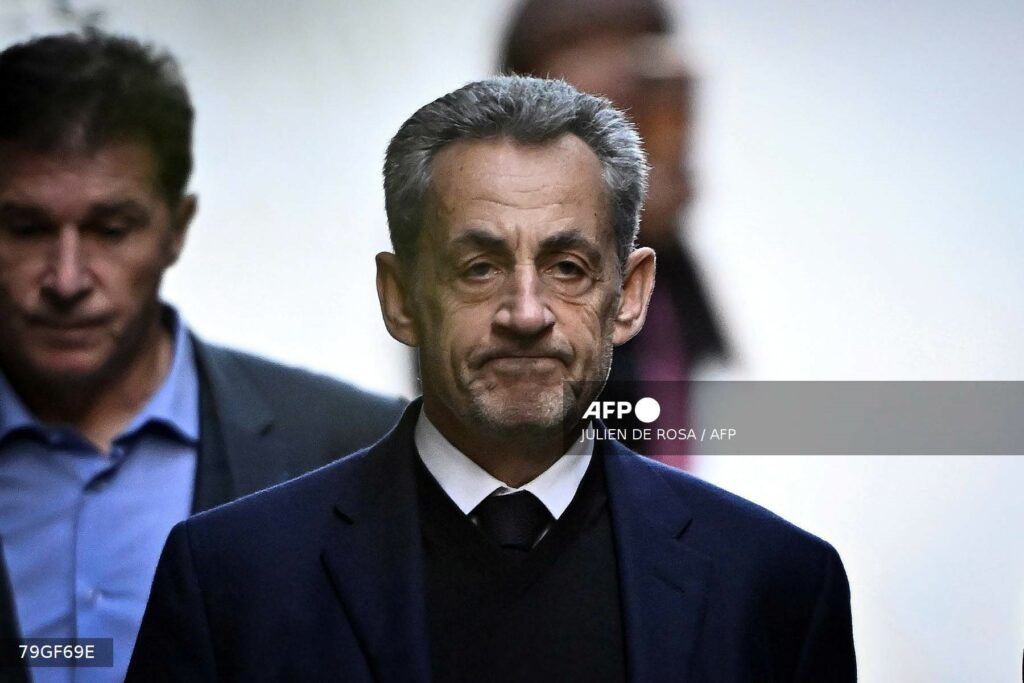France’s former president, Nicolas Sarkozy, has been sent to prison after being found guilty of seeking illegal campaign funding from the late Libyan leader, Muammar Gaddafi, marking the first time a former head of state from a European Union country has been jailed.
The 70-year-old former French leader, who governed from 2007 to 2012, began serving his sentence on Tuesday at La Santé Prison in Paris after a dramatic morning that drew widespread attention across France and beyond.
Sarkozy, who has consistently denied any wrongdoing, was handed a five-year jail term in September for criminal conspiracy linked to a plan to secure funding from Gaddafi’s regime to support his 2007 presidential campaign.
He left his home in the company of police officers on motorbikes, waving to dozens of supporters who had gathered outside to show solidarity. Some carried framed portraits of him, while others sang the French national anthem and chanted, “Free Nicolas!” as he held hands with his wife, singer Carla Bruni, before entering the prison.
Inside the facility, AFP journalists reported hearing inmates shout “Welcome, Sarkozy!” and “Sarkozy’s here!” as he was escorted into the building.
In a defiant message posted on social media platform X (formerly Twitter) shortly before his incarceration, Sarkozy maintained his innocence, writing, “It is not a former president of the republic being jailed this morning, but an innocent man. I have no doubt. The truth will prevail.”
His lawyer, Christophe Ingrain, said an appeal for his release had already been filed, adding that Sarkozy could spend at least three to four weeks in prison while the Paris appeals court considers his case. “The court technically has two months to decide, but it is usually faster,” Ingrain told reporters.
Sarkozy is expected to be held in solitary confinement for security reasons, in a nine-square-metre (95-square-foot) cell equipped with basic amenities. Prison officials said he would be allowed to take daily solo walks and receive visitors three times a week. He reportedly brought with him a biography of Jesus and the classic novel The Count of Monte Cristo — a story about an innocent man wrongly imprisoned who later seeks justice.
Sarkozy is the first French leader to be jailed since Philippe Pétain, the head of state who collaborated with Nazi Germany during World War II.
The case that led to his imprisonment, often referred to as the “Libyan case,” has been one of France’s most closely watched political scandals. Prosecutors claimed that Sarkozy’s aides reached an agreement with Gaddafi’s regime in 2005 to channel millions of euros in illegal funds to his 2007 campaign in exchange for diplomatic support.
Investigators alleged that the deal helped Gaddafi’s Libya re-enter the international scene after years of sanctions over the 1988 Lockerbie bombing in Scotland and another air disaster over Niger in 1989.
Although Sarkozy was convicted of criminal conspiracy, the court stopped short of concluding that he personally received or used the money. He was cleared of more serious charges, including embezzlement of Libyan public funds, passive corruption, and illegal campaign financing.
This latest conviction adds to Sarkozy’s long list of legal troubles since leaving office in 2012. He has already been convicted in two other corruption-related cases. In one, he served time under house arrest with an electronic ankle tag for attempting to bribe a judge. In another case concerning illegal campaign financing during his 2012 re-election bid, France’s top court is expected to deliver a ruling next month.
Sarkozy has also been stripped of the Legion of Honour, France’s highest distinction, due to his previous convictions.
Public opinion in France remains divided. A recent Elabe poll of over 1,000 adults found that six in ten French citizens believe the prison sentence is fair. However, Sarkozy still commands loyalty among conservative supporters, and he continues to maintain influence within right-wing circles.
President Emmanuel Macron, who met with Sarkozy at the Elysee Palace last week, said it was “normal, on a human level,” to receive a former president in such a situation.
Observers say Sarkozy’s imprisonment marks a historic moment for French politics — one that signals the country’s commitment to judicial independence, even at the highest level of power.
For Sarkozy, however, the battle is far from over. “I will sleep in prison with my head held high,” he said after his sentencing in September, confident that his appeal could eventually overturn the verdict.
